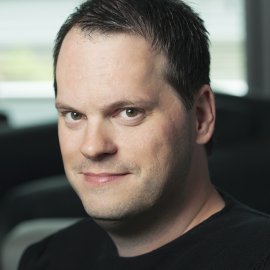Philosophy, University of Bergen, Norway

Octobre 2016 à Juin 2017
Claus Halberg is a philosopher, specializing in phenomenological philosophy, feminist theory and gender studies. He obtained his doctoral degree from the University of Bergen, Norway, in 2013, with a dissertation on the gendered rhetoric of Maurice Merleau-Ponty’s philosophy of nature. He has taught seasonally at the Philosophy Department and at the Gender Studies program, the University of Bergen, while presenting and publishing nationally and internationally as an independent scholar. Following the conclusion of his fellowship at IEA de Nantes, he will commence a three-year Marie Sklodowska Curie Actions individual global fellowship, to be conducted in part as a visiting researcher at Duke University (USA), and in part at the University of Bergen. His research focuses on the relations and tensions between phenomenology, naturalism and feminist theory with regard to the nature of value, normativity and sexual difference.
"Phenomenology, Naturalism and Normativity"
The project addresses the problem of normativity as it has recently taken shape in contemporary philosophy. This problem concerns how to make sense of the nature and status of normative concepts, vocabulary or discourse vis à vis the descriptive and explanatory vocabularies endorsed by the natural sciences. On a deeper level, it is a matter of accounting for the source of the normative constraints that constitute certain mental events and behaviours as “thoughts” and “actions.” The project approaches this problem by bringing into play a trio of Western philosophical traditions that are only rarely considered together. The first is the phenomenological tradition, such as it was inaugurated by Husserl, characterized by its methodological privileging of the 1st person perspective and the imperative of investigating issues in terms of “lived experience,” i.e., the life-world of human persons. The second tradition invoked is the pragmatic naturalism associated with figures such as Robert Brandom and Huw Price, characterized by a stronger Wittgensteinian emphasis on the grammar of social or discursive practices, understood as life-forms having a natural history. In the process of articulating the tension between these two accounts of normativity, the project will invoke – thirdly – the biological philosophy of Georges Canguilhem, characteristically referring the force of normativity back to the “vital norms” that become manifest on occasion of their violation in and through pathology. The working hypothesis of the project is that Canguilhem’s concept of biological normativity might be able to address the pitfalls of the other two perspectives: On the one hand, the inflated conception of subjectivity as personhood in phenomenology, which makes it difficult for phenomenology to co-exist with natural science short of a reduction of the latter to a mere “abstraction” or “distortion” of the allegedly fundamental “personalist attitude”; On the other hand, the deflation of subjectivity in pragmatic naturalism’s overemphasis on discursive practices, which would seem equally to consign its concept of normativity to a narrow and naturalistically unwarranted anthropocentrism.
HALBERG, Claus Fighting the Good Fight.On Some Recent Transcendentalist Objections to ’Naturalized Phenomenology’, Etudes phénoménologiques - Phenomenological Studies, vol1, 2017, p.135-165
HALBERG, Claus "Deleuze kontra fenomenologien: Forskjeller som giør en forskjell".A paraitre
HALBERG, Claus. 2014. Emergent Life: Addressing the 'Ontological Diplopia' of the 21st Century with Merleau-Ponty and Deacon. Discipline filosofiche, vol.24 (2014): 185-215.
HALBERG, Claus “Grappling with Neurosexism” Tidsskrfit for kjønnsforskning, vol.38 (2014), no 3-4,pp 326-331.
HALBERG, Claus & ØYEN, Simen A; "Cognition and Emotion: From Dichotomy to Ambiguity." Analecta Husserliana, The yearbook of Phenomenological Research 116 (2014) pp 473-484.
HALBERG, Claus. 2011.”The Tangible Invisible: Irigaray's Phenomenological Critique of Merleau-Ponty's Notion of the Flesh”. Kapittel, . In: SERVAN, Johannes &AARØ, Ane F. (eds.),Environnement, Embodiment and Gender,Bergen, Hermes Text,2011pages 107-131,